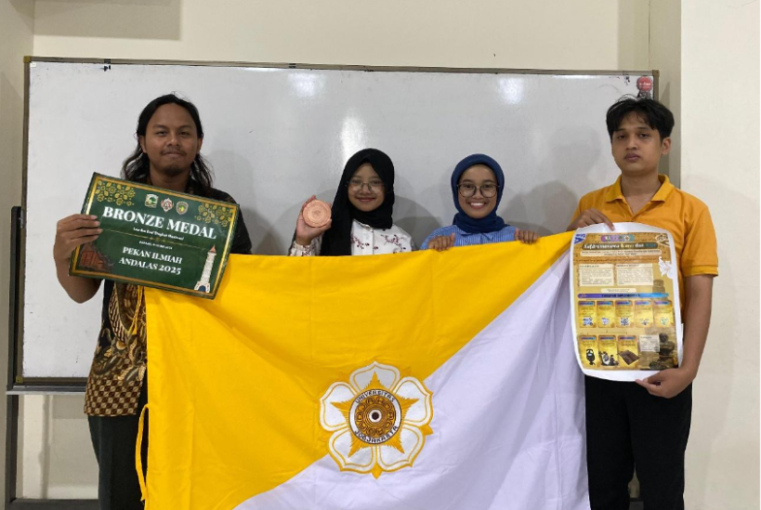
Universitas Gadjah Mada (UGM) students have made another proud achievement. The Basabuja team consisting of students of the Javanese Language, Literature and Culture Study Program, Faculty of Cultural Sciences (FIB), won a bronze medal in the national essay competition at the Andalas 2025 Scientific Week. The competition was organized by the Political Science Student Association (HIMAPOL) of Andalas University, West Sumatra.
The Basabuja team, which is an acronym for Javanese Language, Literature, and Culture, consists of four students namely Muhammad Siswoyo, Yudha Adistira, Dwi Mei Saroh, and Dian Nitami. In the competition that was held offline, the Basabuja team carried the subtheme of Law and Culture with the essay title Kuṭāramanawa: Ancient and Present Ramanawa.
The essay raised the customary law during the Majapahit Kingdom, which was recorded in Kuṭāramanawa. “What is applied from Kuṭāramanawa is in the form of Smart QR Code and Internet of Things (IoT). As a law that contains very complete social rules, with 275 articles and 19 chapters, we realize that Kuṭāramanawa has values that are relevant to today’s social and environmental conditions,” said Yudha Adistira in an online interview (28/05/2025).
According to Dwi Mei Saroh, in an online interview (24/05/2025), their team had to go through an elimination stage before entering the final round. The final round was held on May 10-13, 2025, with a presentation session on the 11th and the announcement of the winner on May 12. “The only one who represented our team to go and present at Andalas was Siswoyo,” he said.
The process of composing the essays that the team went through was not easy. Dian Nitami said that their long journey began in January 2025. “From the process, of course, many dynamics occurred and the toughest lies in the cost constraints. However, this was overcome with the commitment and solidarity of the team and the help of many other parties. Therefore, we would like to thank you for all the help that has been given,” he explained in an online interview (24/05/2025).
This achievement is expected to be a spark of enthusiasm for students of the Javanese Language, Literature and Culture Study Program to continue to work and innovate. In addition, Muhammad Siswoyo invited the younger generation to keep trying to preserve, explore knowledge, and innovate from Javanese literary works. “Javanese literature has many innovative opportunities that can be developed with an interdisciplinary approach. Many branches of science are connected to the laws, customs, culture, and habits of the Javanese people. Friends can utilize this into new innovations. For that, let’s preserve Javanese culture,” he said in an online interview (24/05/2025).
In line with this, Yudha Adistira emphasized the importance of accessibility to classic manuscripts as an effort to preserve and utilize the noble values of the nation. “Customary law is often considered ancient and left behind, but in fact it contains values that are very relevant to the present. However, access to manuscripts such as Kuṭāramanawa is still very limited. Therefore, we feel it is important to digitize this manuscript so that it can be more widely accessed, studied, and reapplied, especially in the context of legal education, cultural preservation, and national character building. We believe that technology can be a bridge between the past and the future,” he concluded.
Author: Haryo Untoro
Editor : Haryo Untoro

